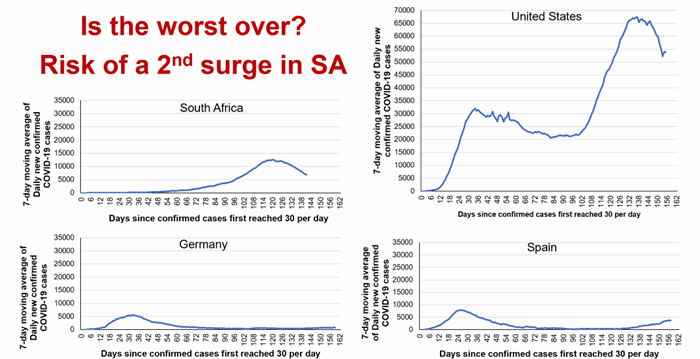- SA has seen a decline in reported Covid-19 cases over the last few weeks
- However, we need to be cautious, as a second wave is still possible
- Some countries who had a drop are now experiencing a second wave, said Professor Karim
South Africa has seen a steady decline in the number of new Covid-19 cases over the last two weeks, Professor Salim Abdool Karim, epidemiologist and infectious diseases specialist and chair of the South African Ministerial Advisory Committee on Covid-19 said on Thursday.
Professor Karim was speaking during the 2020 Thought-Leader Webinar Series on Health and Modelling during Covid-19, which was hosted by the University of the Free State.
While in late July, the country experienced a rise of around 12 000 to 13 000 new cases per day, this number has dropped to under 6 000 as we reach mid-August.
Karim drew on hospital data, predominantly from the private sector and several public hospitals, to show the decline in the number of hospital admissions over the last couple of days.
This downward trend in case numbers has occurred consistently and is “very promising”, said Karim, but added that there is still potential for a second wave.
Is the worst over?
“The answer to that is not a clear-cut one,” said Karim. “We are particularly concerned about the risk of a second surge. In fact, if anything really concerns me at this stage, it’s the [possibility of a] second surge and how the epidemic may play out over the next several weeks.”
Comparing South Africa’s infection rates to those of Germany, the US and Spain, Karim explained that Germany – which had one of the best global responses to the crisis as they contained the epidemic quite quickly – experienced a rapid increase in cases, followed by a decline, and have since maintained a low level.
Looking at where we are in SA with case numbers, Karim said that if SA can get to the same point that Germany has reached, where case numbers remain steadily low, we can be more confident. As it stands, we do still have the potential to experience a second surge, Karim added.
“There are a few countries that have had this situation, such as the US. After they had their first surge, the numbers started coming down, and they stopped implementing prevention measures...
“What happened is that they ended up with a second surge in various states, and now they’re in a worse surge than the first one. And so that’s what we want to avoid. At this stage, it looks pretty compelling that we’re not going down that road, but one would like to see this get to a lower point,” Karim cautioned.
Spain seeing a second surge in cases
After Spain experienced its initial epidemic, they saw a drop in Covid-19 cases. This low rate simmered for a while, but a recent surge in cases sparked fears of a second wave.
“Spain is in the midst of its second outbreak,” said Karim. “Cases are occurring at a pretty high rate, and that’s part and parcel of the challenge we deal with in this epidemic.”
Touching on the success of several countries in managing the epidemic, Karim argued that although some of these countries, including New Zealand, South Korea, Vietnam, and Singapore have done well in containing case numbers, some of them have been in situations where things can rapidly turn around.
On Tuesday, New Zealand announced that they would be going back into lockdown in the capital, and Singapore has had major outbreaks in hostels where migrant workers live.
Vietnam has also taken rapid action to stem a new Covid-19 outbreak, with a central Vietnamese city back in lockdown, the BBC reported.
“So country after country, even after success and claiming elimination, are seeing these second waves. And so, we need to be very careful that this is not a time for complacency. As we go through this epidemic, as we learn to coexist with this virus and aim for containment, we have to go on the basis of planning for the long-term.
“Even if we get a vaccine, it is unlikely that we will be able to vaccinate a substantial part of our population before the end of next year. So we need to transition from being scared, to a situation where we can control our risk. And we know that we influence our risk, and consequently the risk of everyone else around us,” said Karim.
Taxis should be at 50% capacity
Karim also weighed in on government’s new taxi regulations earlier this month, allowing for 100% seating in taxis over short distances and at 70% capacity over long distances, News24 reported.
“We’ve managed to have this epidemic curve as a positive feature, but we have to be deeply concerned that there may be interventions that need to be instituted, should we see this curve changing,” said Karim.
“One of those is our transport, whether it’s buses, trains, aeroplanes or taxis. There’s no study that shows one is better than the other, but the general principle is that we want to have a situation where no two people are sitting next to each other, and that should ideally be a situation of 50% capacity.”
If this capacity percentage is not viable in that it impacts the transport industry’s survival, it may pose a potential problem by aiding the spread of the virus, added Karim.
“If we start seeing evidence that taxis are part and parcel of the problem, and that they are fostering the spread of the virus, then action will definitely need to be taken."




 Publications
Publications
 Partners
Partners












